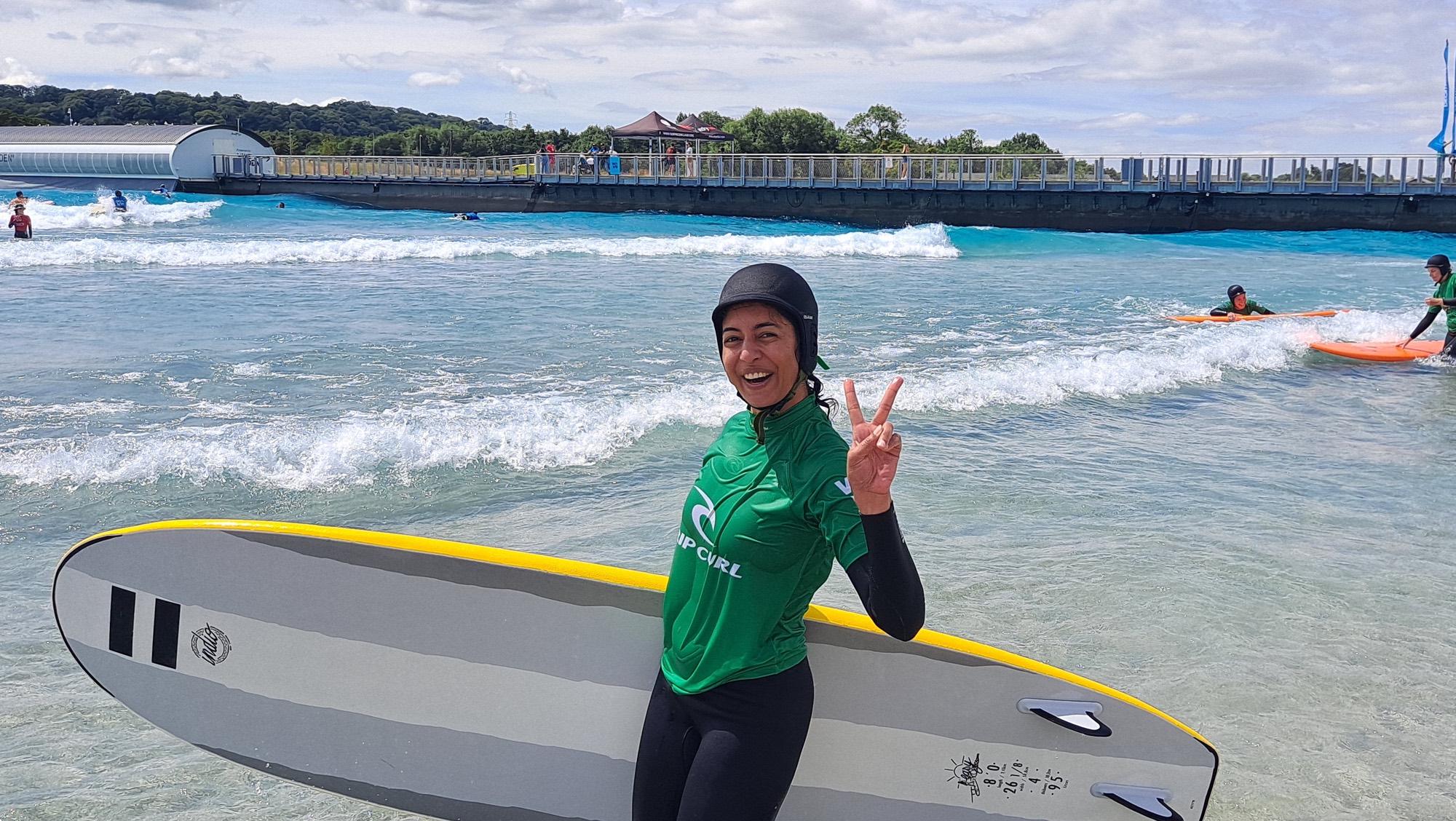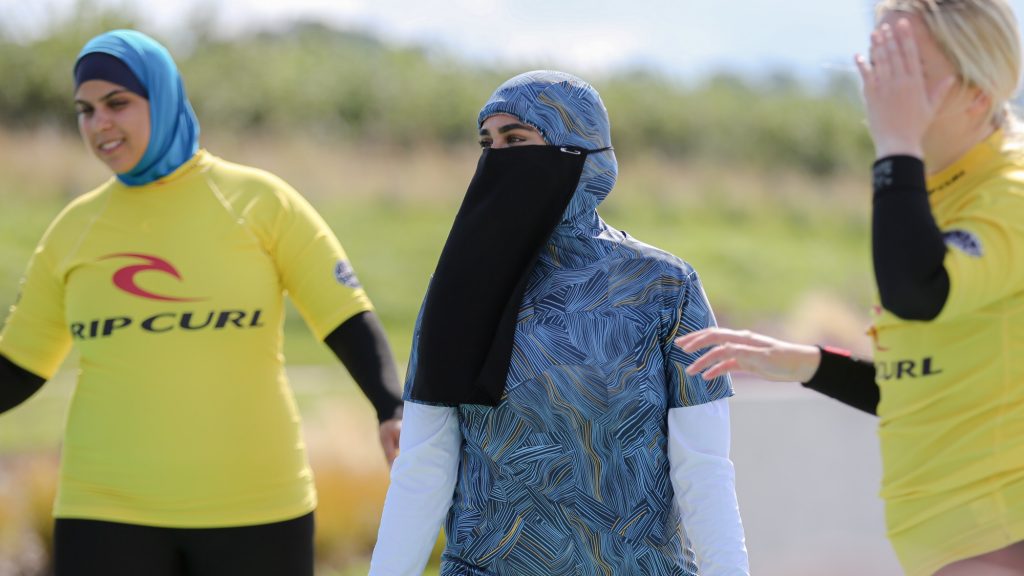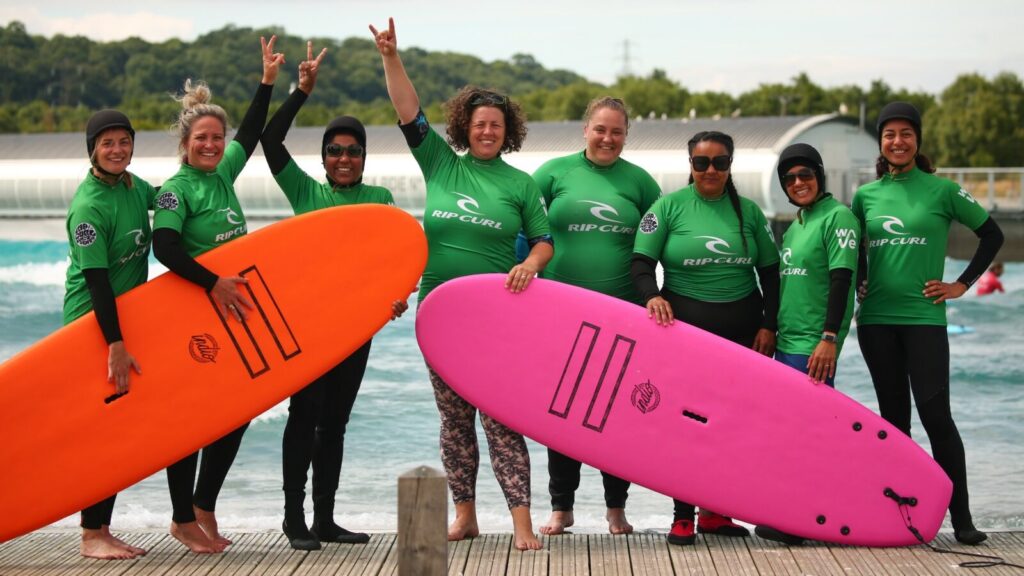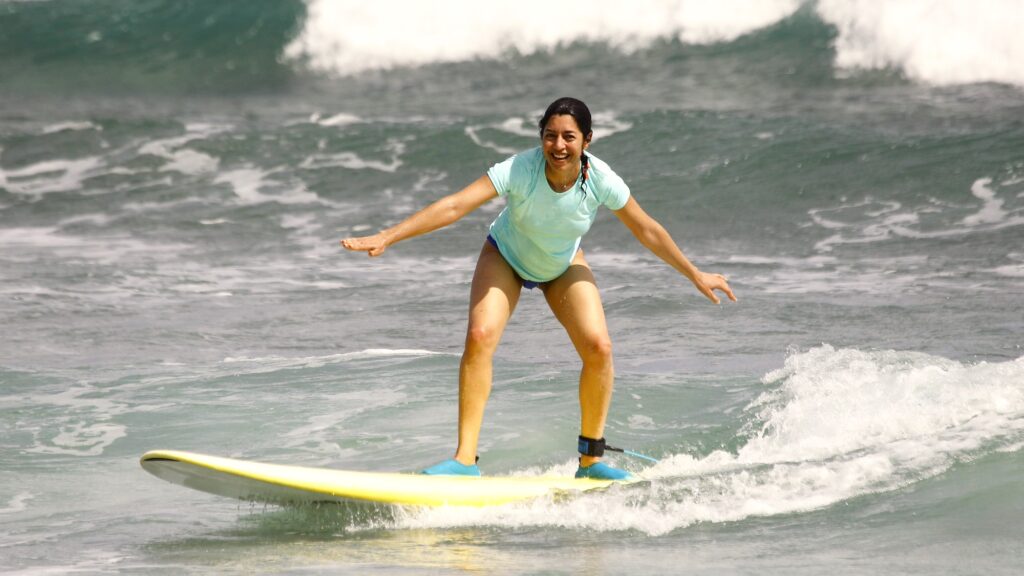Would you spend 3 years of your life studying wave pool surfing? This researcher is doing just that (and more)

We spoke with Ariane Gerami, a researcher conducting a wave pool study to find a correlation between surfing and feelings of happiness. Gerami discovered that, yes, surfing does indeed give you feelings of joy. But her initial research only scratched the surface. She’s now committed to doing even more work from the edge of the pool in Bristol.
Ariane Gerami doesn’t consider herself a surfer yet, but she’s decided to dedicate the next three years of her life to the sport.
After completing a six-week study on the benefits surfing has on mental health as part of her Master’s Program at the University of Bristol, Gerami was inspired by the results. She’s now committed to a PhD in Nutrition and Public Health where she will commence a three-year study that follows up on the relationship between mental health and surfing.
And while she certainly will ride a few waves along the way, that’s not the goal. The ultimate objective is to solidify surfing as a data-backed prescription for mental health issues such as PTSD or depression.
The completed study, conducted in a pool at The Wave in Bristol, England, was used to test an online data collection tool that measures well-being. The study featured a cohort of 15 female participants from socioeconomic groups that would not generally have access to a wave pool. The results were promising.
“We saw that there was indeed an increase in well-being around the time of the courses,” the 41-year-old Gerami told Wavepool Mag. “And the long-term well-being also increased over the course of this program.”

As the researcher, Gerami personally felt the effects as well.
“I saw the impact (the study) had on myself and on my mental well-being,” said Gerami. “Seeing the surfers so happy made me happy.”
“I could see the (study participants) arriving a bit weighed down by the daily routine,” added Gerami. “But by the end of the session, the smile that they had was just mind-blowing. This is what we want to bring to people to increase their health.”
Gerami started her academic career as a biology student, going on to work in clinical research for 20 years developing new drugs. However, through this experience, she gained an interest and appreciation for the importance of physical activity and nutrition, which could serve as an alternative or complement to preventing non-communicable diseases and supporting people already impacted by a disease. This newfound passion for alternative paths to health led her to pick up her studies again with a Masters in Nutrition, Physical Activity and Public Health at the University of Bristol.
“The smile that they had was just mind-blowing. This is what we want to bring to people to increase their health.”
– Ariane Gerami
Gerami didn’t go to Bristol seeking out research on surfing. She has spent most of her life living in the landlocked cities of Paris and Bristol. But as someone who often visits the Caribbean isle of Guadeloupe, the birthplace of her mother, she has formed a bond with the ocean via snorkeling, diving, and wakeboarding. It was only a matter of time before surfing found her.
Gerami’s experience and the results from the initial study at The Wave were so encouraging that she decided to dive deeper into the topic. Her three-year Ph.D. program will attempt to build stronger evidence in the area, with some key changes based on the learnings from the first study.
“From my studies, there is a correlation between the increase in mental well-being and the fact that the participant took up a physical activity, but it doesn’t yet prove that, from a scientific point of view, surfing is the cause of this improvement because it was a very small study,” said Gerami. “The next step will be to identify exactly how surfing increases mental well-being, refine that in specific populations, and, if we can, draw a causal relationship rather than only correlations.”

While most surfers can anecdotally attest to the sport’s power to create positive feelings, the goal of her Ph.D. studies will be to prove the causation between surfing and well-being to lead to wider use of surfing as a therapeutic tool in healthcare.
Pilot programs that prescribe activities such as surfing (called “social prescribing”) are already being implemented in the UK to attempt to improve the mental well-being of young people while they are on waiting lists for care.
“What I hope from this Ph.D. is that it will give the social prescribers in the UK evidence that surf therapy is something that works and can help with various ailments,” said Gerami. “There are a lot of things that surfing can improve, increasing our social relationships and physical activity. This could be another tool in the portfolio that can be used when people need that kind of support because it’s making a difference in people’s lives.”
The study is planned to continue at The Wave in Bristol, but Gerami acknowledges that the research is flexible. She doesn’t discard the addition of ocean research, wondering if there could be differences in results between the ocean and pool environments.
“I’ve looked at the literature that already exists on the subject of surf therapy in the ocean and what I found is that the pathway from surfing to mental well-being is quite similar to what I see emerging from the data I’ve collected (from the wave pool),” explained Gerami. “(In both venues) surfing improves mental well-being because it allows restoration, increased focus and respite from daily stress, self-growth, being in a safe space, and increasing your physical activity levels.”

Despite the parallel data between the ocean and the pool, Gerami hypothesizes that there could be some key differences that are worth exploring.
“The controlled space of a wave pool may (lend itself to the creation of positive feelings), but this would need to be researched,” said Gerami. “My feeling is that the pool may help people to say yes to the activity because in the ocean they may not feel as secure. But at The Wave everything is controlled, which I think can decrease the anxiety that would come with taking on a new activity.”
Gerami admits that she entered surf research with stereotypes about what the sport was, but her experience completely flipped those notions on their head.
“Before conducting this study I had the preconceived idea that surfing was rather exclusive and gendered,” said Gerami. “Having seen and now experienced The Wave activities, this changed my perception. I realized how much The Wave (and other organizations) were involved in making surf accessible.”
“It makes me believe that opening up surfing to more diverse communities is possible, so everybody can have a chance to experience the benefits of surfing on mental and physical well-being,” Gerami added.
While she has dedicated the next three years of her life to studying how others fall in love with surfing, Gerami has been bitten by the surfing bug as well.
“I tried surfing the last session (of the six-week study) because the participants were so welcoming and they wanted me to experience it with them,” said Gerami. “So I went out and managed to stand up on my knees, which I thought was great.”
As we spoke to Gerami via video call while on holiday in Guadeloupe, she already had the waves on her mind – looking to get another dose of the same stoke that she hopes her research will soon spread to others.
Related Coverage
